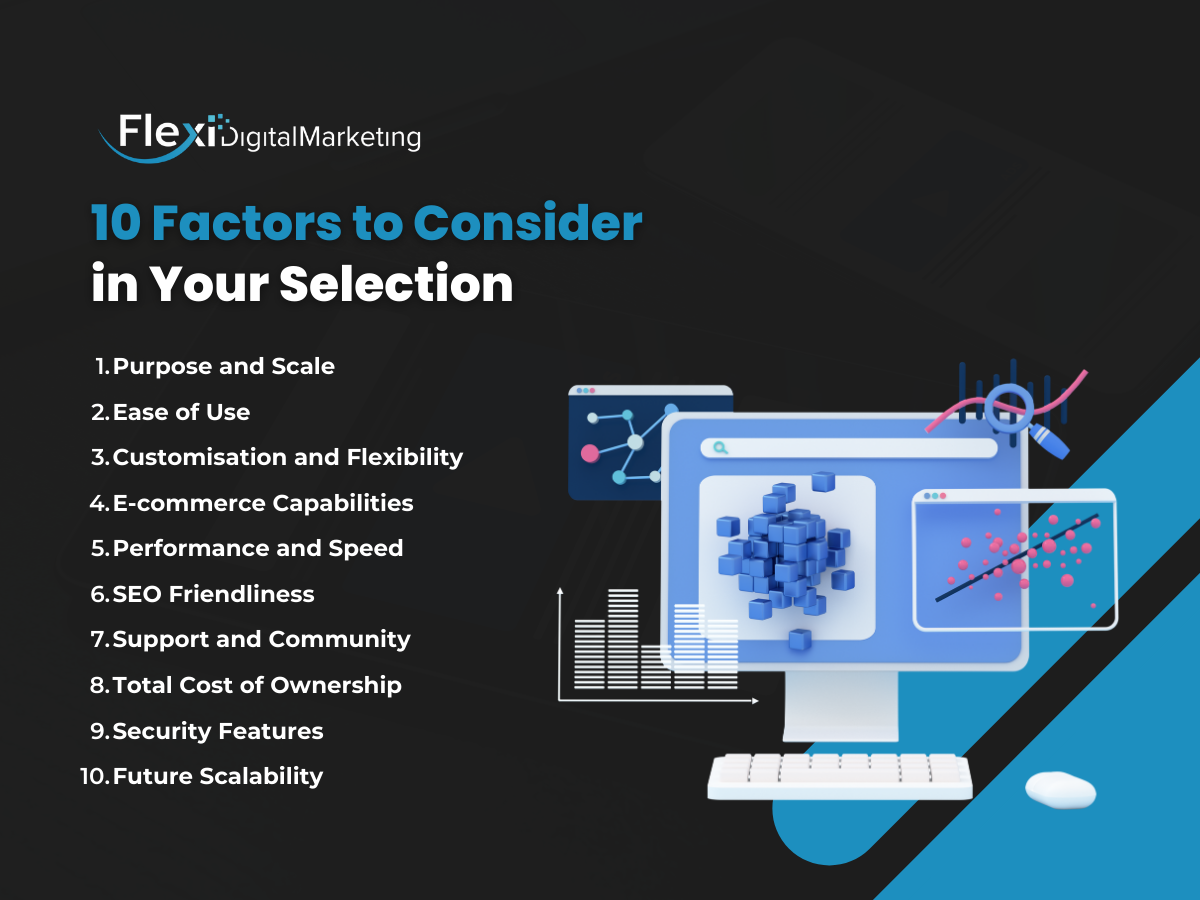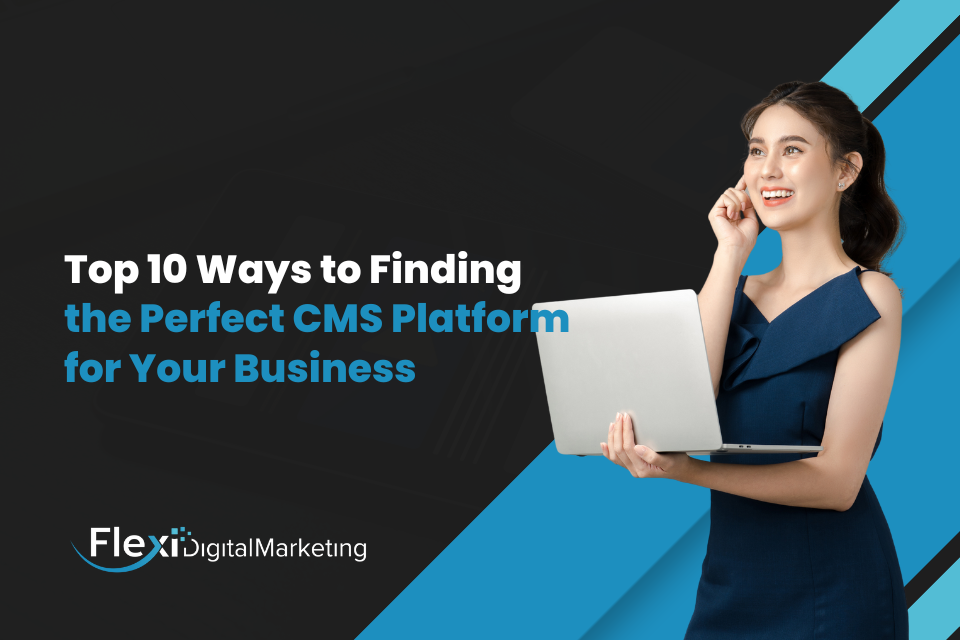Today, a content management system plays a pivotal role in your digital identity. It is the backbone of creating, managing, and presenting your website content and ensuring that you establish a robust presence.
However, with a plethora of CMS platforms available, choosing the right one for your business can be a daunting task. Thus, this article aims to help you navigate this complex decision-making process.
This article will discuss ways to find the perfect CMS platform for your business. These insights will empower you to make an informed choice that aligns with your business goals, technical requirements, and growth aspirations. Join us as we embark on a journey to discover the key factors that will lead you to the CMS platform that best suits your unique needs.
What is a Content Management System?
A Content Management System (CMS) is a platform that enables individuals and organisations to create, manage, and publish digital content online without requiring extensive technical knowledge in web development. It provides a user-friendly interface that allows ordinary users to edit and organise content on their website, such as text, images, videos, and documents.
In essence, a CMS simplifies website maintenance, eliminating the need for manual coding and programming skills. Users can use the CMS's intuitive tools to design their website's layout, structure, and appearance and manage the content displayed to visitors.
CMS platforms offer a range of features, including:
- Content Creation. Users can easily create and format content using text editors similar to word processors. They can upload images, videos, and other media files directly into the CMS.
- Content Organisation. The CMS provides tools to organise content into categories, tags, and hierarchies, making navigating and finding relevant information easier for visitors.
- User Management. Many CMS platforms allow multiple users to collaborate on content creation. Different user roles and permissions can be assigned to control who can edit, publish, or review content.
- Design and Templates. Users can select from various pre-designed templates or themes to style their website. Some CMS platforms also allow for custom design and layout modifications.
- Customisation. CMS platforms offer options to extend functionality through plugins or extensions. These add-ons can provide features like e-commerce, social media integration, etc.
- SEO Tools. Many CMS platforms offer built-in tools to optimise content for search engines, including options to set meta titles, descriptions, and URLs.
10 Factors to Consider in Your Selection
Choosing the suitable CMS involves comprehensively evaluating your business requirements, budget, technical capabilities, and future scalability. Here are essential factors to consider:

1. Purpose and Scale
Every website serves a distinct purpose. It could be an informative blog, a dynamic e-commerce store, a portfolio showcase, a news platform, or something unique. The CMS you choose should seamlessly align with this purpose, providing the necessary features and tools to fulfil your website's objectives.
Thus, before choosing a CMS, try to define the purpose of your website. Is it a blog, an e-commerce store, a portfolio site, or an informational platform? Consider the scale you anticipate in the next few years. For example, a CMS that suits a small blog might need help to handle the demands of a growing e-commerce store.
2. Ease of Use
Not everyone who manages a website is a seasoned coder or developer. Many businesses entrust content creation and management to individuals with diverse skill sets, ranging from marketing professionals to business owners themselves. This diverse user base underscores the importance of a user-friendly CMS interface.
As such, try to consider who will be managing the website. If you lack technical expertise, a user-friendly interface like WordPress or Wix might be more suitable. However, if you have a skilled development team, platforms like Drupal offer extensive customisation.
3. Customisation and Flexibility
Your business isn't like any other—it has distinct personalities, objectives, and strategies. A one-sise-fits-all approach to website design and functionality won't do justice to your uniqueness.
So, before choosing your CMS, constantly evaluate the level of customisation your business requires. Some CMS platforms offer ready-made themes and templates, while others allow deep customisation of design and functionality. Balance this with the available resources and timeline.
4. E-commerce Capabilities
For businesses focused on selling products online, e-commerce features are crucial. E-commerce capabilities within a CMS empower you to establish an online storefront that's open 24/7, enabling customers to browse, select, and purchase products at their convenience. This continuous accessibility opens doors to increased sales and revenue streams that would be challenging to replicate through traditional brick-and-mortar operations alone.
As such, remember to look for platforms with secure payment gateways, inventory management, product catalogues, and marketing tools tailored to e-commerce.
5. Performance and Speed
In an era of instant gratification, your website's loading speed plays a pivotal role in engaging visitors and retaining their attention. Studies have shown that a mere delay of a few seconds in page loading can lead to increased bounce rates and decreased user satisfaction. With countless options, users are unlikely to wait for a sluggish website to load when they can swiftly move on to a competitor's site.
Choose a CMS that generates optimised code and offers features to enhance loading times. This not only contributes to faster load times but also makes your website more accessible to search engines and reduces the strain on your hosting resources.
6. SEO Friendliness
Search engines serve as the gateway through which users discover content on the internet. When potential customers seek products, services, or information related to your business, you want your website to be prominently displayed in search engine results.
An SEO-friendly CMS can streamline your efforts to rank higher in search engine results. Features like customisable URLs, metadata control, and integration with SEO plugins are essential.
7. Support and Community
No matter your level of expertise, the digital landscape can pose hurdles that demand timely solutions. As such, it’s essential to consider the availability of customer support, documentation, and an active user community. This can be a lifesaver when you encounter technical issues or need guidance.
A CMS offering robust support channels ensures you're always caught up in technical glitches, configuration quandaries, or optimisation dilemmas. In addition, the collective knowledge of a CMS's user community is an invaluable resource.
8. Total Cost of Ownership
As your business scales, so do your digital needs. An effective Total Cost of Ownership (TCO) analysis considers how the CMS's pricing structure evolves as your website's demands increase. Some platforms might have reasonable entry-level costs but become disproportionately expensive as you require more advanced features or accommodate higher traffic.
So, always factor in the initial setup costs and ongoing expenses. This can include hosting, domain, plugin/theme costs, and potential developer fees for customisation.
9. Security Features
The digital landscape is rife with cyber threats—malware, hacking attempts, data breaches, and more. It's not a matter of if but when a security threat will arise. An unsecured CMS leaves you vulnerable to these threats, resulting in financial loss, legal liabilities, and damage to your brand's credibility.
Likewise, prioritise platforms that offer robust security features, regular updates, and compliance with data protection regulations.
10. Future Scalability
As your business grows, your website's demands will evolve. A CMS lacking scalability may need help to keep up with your changing demands, resulting in bottlenecks, performance issues, and costly migrations.
Likewise, choose a CMS that can scale with your needs without compromising performance or user experience.
Top CMS Platforms in 2024
As of 2024, the landscape of Content Management Systems (CMS) continues to evolve, with several platforms vying for the top spot based on various criteria such as features, user-friendliness, scalability, security, and more. Here are a few prominent CMS platforms that have garnered attention and recognition in 2024 include:
- WordPress. Undoubtedly, WordPress still retains its crown as one of the most popular CMS platforms globally. With a vast array of themes, plugins, and a user-friendly interface, it's the go-to choose for small businesses, bloggers, and content-focused websites.
- Drupal. Known for its robustness and scalability, Drupal is favoured by enterprises and organisations that require advanced customisation and complex content structuring. However, it typically demands a steeper learning curve and more technical expertise.
- Joomla. Positioned between WordPress and Drupal in complexity, Joomla offers flexibility and user-friendliness. It's suitable for medium-sized businesses looking to scale up their online presence.
- Shopify. For e-commerce businesses, Shopify has established itself as a powerhouse. It offers a seamless platform for setting up and managing online stores, complete with payment gateways, inventory management, and marketing tools.
- Wix. Startups and small businesses often choose Wix for its simplicity and drag-and-drop website-building capabilities. While it's less customisable than other options, it's a quick solution to get a website up and running.
- Magento. Another heavyweight in the e-commerce realm, Magento is preferred by larger businesses with complex needs. It provides extensive customisation options but might require more technical resources.
- Squarespace. Like Wix, Squarespace is known for its user-friendly interface and visually appealing templates. It's often chosen by creative professionals, artists, and small businesses prioritising aesthetics.
- Ghost. Ghost is a minimalist CMS platform focused explicitly on blogging. It's popular among bloggers and content creators who prioritise writing and simplicity.
Making the Final Choice
The CMS platforms each cater to specific business needs and technical aptitudes. So, your final decision should align with your business goals, resources, and future aspirations.
Take the time to thoroughly evaluate your options, consider your long-term strategy, and test out platforms before committing. Remember, the perfect CMS is the one that empowers your business to shine in the digital realm, effortlessly delivering your brand's message to the world.
If you still can’t choose, let Flexi Digital Marketing can help you! With our expertise in web development and a profound understanding of the CMS landscape, we offer a tailored approach to finding the perfect solution for your business.


